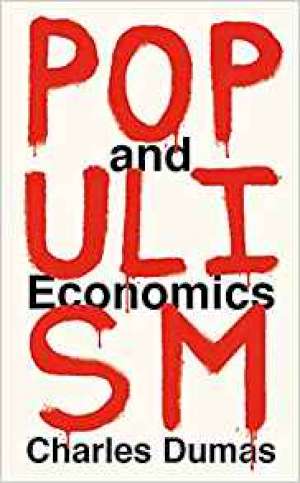20 November 2018
Populism and Economics
Charles Dumas
2018, Profile Books, 192 pages,
ISBN 9781788161893
Reviewer: Dame Kate Barker, Chairman of Trustees, British Coal Staff Superannuation Scheme

In his introduction, Dumas makes the very welcome point: ‘It is vital that the label ‘populism’ does not become a sneer.” His argument is that technological, economic and demographic developments are leading to poorer labour market prospects for the less-skilled in developed economies, and stagnant real wages. The resultant discontent should not simply be ignored.
Most of this (relatively short) book is taken up by a very clear account of how we got here – starting from the savings glut in Japan, other Asian countries, Germany and, latterly, China. These various gluts result from policies which may make apparent sense for the countries individually, but do not make sense for the world economy collectively. His essential argument is that low interest rates have then encouraged excessive investment, the low- quality of which has reduced growth potential.
Dumas follows other commentators in attributing the financial crisis to the build-up of debt resulting from low savings. His account of the crisis aftermath is critical of the policy response – arguing that there was a contrast to 1970s when there was a crisis of excessive demand, leading to the need for inflation control via monetary policy. In the aftermath of the GFC, however, the problem has rather been chronically weak demand, meaning that fiscal policy would have been a more apt solution.
He argues that in these circumstances monetary policy was ineffective (‘pushing on a piece of string’) with the side-effect of supporting those to blame for the crisis and disproportionately benefiting the owners of real assets. While I have some sympathy with the line of argument, it’s also worth remembering that when QE was first introduced, supporting real asset prices from collapse was in important aim. The problem has arisen with the further extensions of QE and the perceived requirement to keep monetary policy easy for a far longer period than initially expected.
Dumas then gives a series of stimulating accounts of the tensions inherent in the present and likely future for the economies of Japan, China, the Euro area and Britain. The core of his argument is that the arrival of hi-tech alongside globalisation (and combined with demographic trends – a mix of ageing and immigration) has led to a worsening outlook for particular sectors of most democratic economies. Yet few seem to be moving towards effective policy solutions, and Trump’s policy of protectionism is likely to prove damaging.
What are his solutions? He argues powerfully that the continued pursuit of inflation targets is the wrong solution and has kept monetary policy too easy for too long. In particular he favours more fiscal union in the euro area – and, more radically, argues for a euro-exit for Italy. Part of the rationale given for this is a divergence of views of populists in Germany and Italy.
But the cornerstone of the book is that we need to compensate the losers from the present structure of growth. This implies both giving them due respect (not the sneer) and more substantively shifting towards more taxation of wealth. In addition, there should be reforms of corporate taxation – seeking ways to tax where profits arise, which could include moving away from corporation tax.
This book packs quite a punch – although there is less of a critique of ‘popular populist’ solutions than I had expected. Yet the basic argument, that if the winners ignore the cries of the losers political ramifications will in the end prove bad for all of us, is surely right and indeed borne out by Trump and (less certainly) Brexit.
